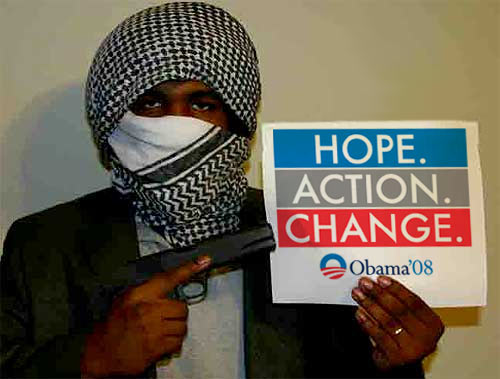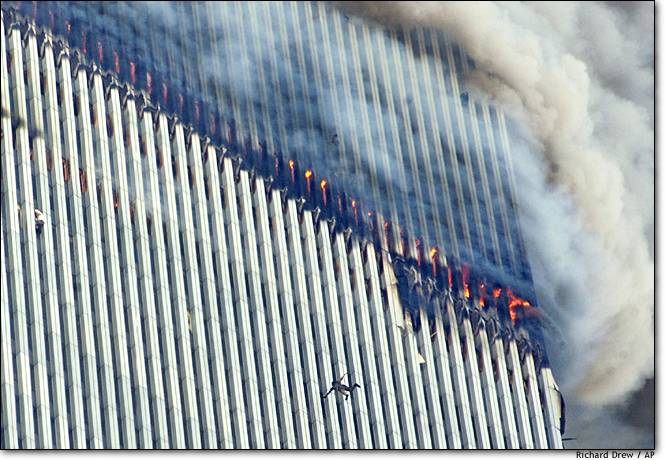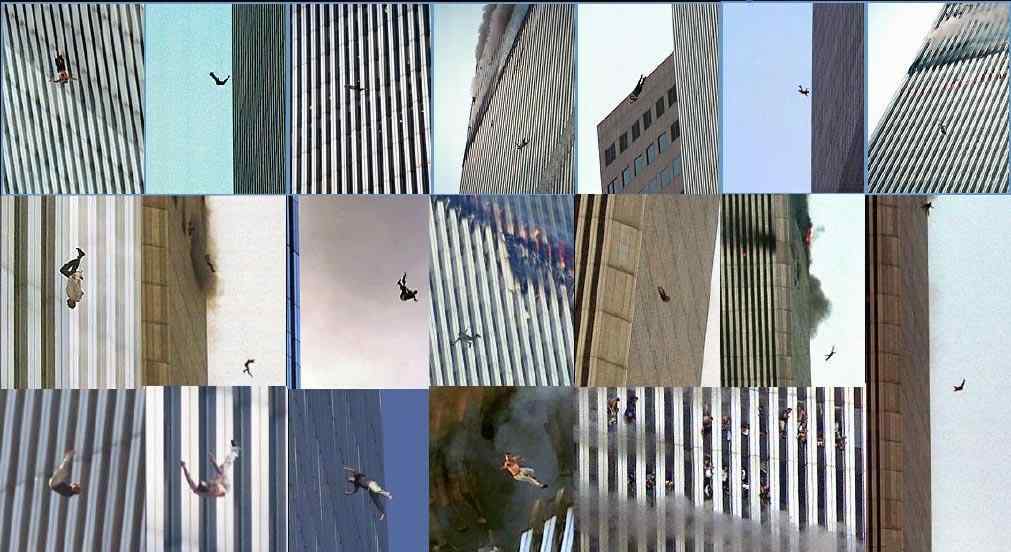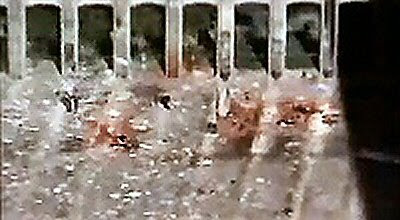
Posted on 06/04/2009 6:16:49 PM PDT by Cindy

Hokey Smoke Bullwinkle, that was long. He must have brought the water cooled teleprompter.
“A new beginning” and “in the beginning” are very similar phrases . . . coincidence? I think not.

"And finally, just as America can never tolerate violence by extremists, we must never alter or forget our principles.
Nine-eleven was an enormous trauma to our country. The fear and anger that it provoked was understandable,
but in some cases, it led us to act contrary to our traditions and our ideals. We are taking concrete actions to change course.
I have unequivocally prohibited the use of torture by the United States, and I have ordered the prison at Guantanamo Bay closed by early next year. (Applause.)"














"Obama sObama shifts FBI from Counter Terrorism to Fraud"
Whatever this SOS says, you may know the opposite is what he means.
Really? Ask Jews how tolerant islam is. Ask women how tolerant islam is. Ask Americans who witnessed the events of 911 how tolerant islam is.
The man's a liar.
Adding links to post no. 1:
Whitehouse.gov - Videos on YouTube:
http://www.youtube.com/profile?user=whitehouse&view=videos
#
Note: There is a lower quality version of this video at the above link.
http://www.youtube.com/watch?v=NaxZPiiKyMw
“President Obama Speaks to the Muslim World from Cairo, Egypt”
(Added June 4, 2009)
ADDING a link to post no. 1...
Note; The following text is a quote:
http://www.usdoj.gov/ag/speeches/2009/ag-speech-090604.html
Statement of Attorney General Eric Holder on Department of Justice’s Outreach and Enforcement Efforts to Protect American Muslims
Thursday, June 4, 2009
U.S. Attorney General Eric Holder released the following statement relating to President Obama’s historic speech today in Cairo, Egypt:
“The President’s pledge for a new beginning between the United States and the Muslim community takes root here in the Justice Department where we are committed to using criminal and civil rights laws to protect Muslim Americans. A top priority of this Justice Department is a return to robust civil rights enforcement and outreach in defending religious freedoms and other fundamental rights of all of our fellow citizens in the workplace, in the housing market, in our schools and in the voting booth.
“There are those who will continue to want to divide by fear - to pit our national security against our civil liberties - but that is a false choice. We have a solemn responsibility to protect our people while we also protect our principles.”
###
Is that like when you ignore the past?
ML/NJ
Off (Thread) Topic, but it does somewhat go with today’s speech by President Obama.
#
Video:
http://www.fbi.gov/multimedia/jrspecialagents060509/jrspecialagents060509.htm
“Junior Special Agents”
Featured Video
Blog:
www.jihadica.com/jihadi-reactions-to-obama/
“Jihadi reactions to Obama”
Thomas Hegghammer
June 4th, 2009 | Arab media, Dreams, Egypt, Jihadi media, Saudi Arabia, Uncategorized, propaganda, tactics
Very interesing, thank you.
You’re welcome Velveeta.
http://www.whitehouse.gov/the_press_office/Remarks-by-the-President-at-Cairo-University-6-04-09/
http://www.whitehouse.gov/blog/NewBeginning/
#
Note: The following text is a quote:
http://www.defenselink.mil/news/newsarticle.aspx?id=54631
Obama Cites Shared Principles in Reaching Out to Muslim World
By Donna Miles
American Forces Press Service
WASHINGTON, June 4, 2009 – President Barack Obama reached out to the Muslim world today, urging a new beginning that rises above historical tensions and is built on commonly held principles that reject violence and promote cooperation and stability.
Obama, speaking at Cairo University in Egypt, told a predominantly Muslim audience that violent extremists have exploited longstanding tensions and misunderstandings to further divide the United States and Muslims around the world.
“The attacks of Sept. 11, 2001, and the continued efforts of these extremists to engage in violence against civilians has led some in my country to view Islam as inevitably hostile, not only to America and Western countries, but also to human rights,” he said. “This has bred more fear and distrust.”
Emphasizing that the United States “is not – and never will be – at war with Islam,” Obama said it will “relentlessly confront violent extremists who pose a grave threat to our security.”
Obama dismissed any notion that the 9/11 attacks were justified.
“Let us be clear: al-Qaida killed nearly 3,000 people on that day. The victims were innocent men, women and children from America and many other nations who had done nothing to harm anybody,” he said. “And yet, al-Qaida chose to ruthlessly murder these people, claimed credit for the attack, and even now states their determination to kill on a massive scale.”
With affiliates around the world, Obama said, these extremists are trying to expand their reach. “These are not opinions to be debated,” he said. “These are facts to be dealt with.”
Obama said his first duty as president is to protect the American people, and said he won’t compromise that responsibility as he works to promoting international cooperation in standing up to violent extremists.
The president pointed to the situation in Afghanistan as an example of America’s goals and the need for the United States and the Muslim world to work together.
“Over seven years ago, the United States pursued al-Qaida and the Taliban with broad international support,” he said. “We did not go by choice, we went because of necessity.”
Obama emphasized that the United States has no interest in keeping its troops in Afghanistan or establishing military bases there.
“It is agonizing for America to lose our young men and women. It is costly and politically difficult to continue this conflict,” he said. “We would gladly bring every single one of our troops home if we could be confident that there were not violent extremists in Afghanistan and Pakistan determined to kill as many Americans as they possibly can. But that is not yet the case.”
That’s why the United States is a partner in a 46-nation coalition, he said, and why it won’t weaken in its commitment despite the costs involved.
Obama pointed to the role Muslims must play in standing up to this violence.
“None of us should tolerate these extremists,” who he said have killed people of all faiths, especially Muslims, around the world. “Islam is not part of the problem in combating violent extremism. It is an important part of promoting peace.”
Military power alone won’t solve the problems in Afghanistan and Pakistan, he said. He noted U.S. plans to invest $1.5 billion each year for the next five years in infrastructure and service support in Pakistan, and more than $2.8 billion to help the Afghans develop their economy and deliver services to the people.
Turning his focus to Iraq, Obama acknowledged the strong differences the operation there has provoked in the United States and around the world.
“Although I believe that the Iraqi people are ultimately better off without the tyranny of Saddam Hussein, I also believe that events in Iraq have reminded America of the need to use diplomacy and build international consensus to resolve our problems whenever possible,” he said.
In the meantime, America has a responsibility to help Iraq forge a better future, then to leave Iraq to Iraqis, he said.
“I have made it clear to the Iraqi people that we pursue no bases and no claim on their territory or resources,” he said. “Iraq’s sovereignty is its own.”
That’s why he ordered U.S. combat brigades to leave Iraq by August 2010, Obama said, and why the United States will honor its security agreements with Iraq’s democratically elected government. This requires all combat troops to leave Iraqi cities by June 30 and to leave Iraq altogether by 2012.
“We will help Iraq train its security forces and develop its economy,” Obama said. “But we will support a secure and united Iraq as a partner, and never as a patron.”
As it stands up to the forces that threaten it, the United States will remain true to its ideals, Obama said.
“Just as America can never tolerate violence by extremists, we must never alter our principles,” the president said. Noting that “9/11 was an enormous trauma to our country” that provoked understandable fear and anger, Obama said, “in some cases, it led us to act contrary to our ideals.”
“We are taking concrete actions to change course,” he told the audience. “I have unequivocally prohibited the use of torture by the United States, and I have ordered the prison at Guantanamo Bay closed by early next year.”
The United States will defend itself, respectful of the sovereignty of nations and the rule of law, Obama said. “And we will do so in partnership with Muslim communities which are also threatened,” he said. “The sooner the extremists are isolated and unwelcome in Muslim communities, the sooner we will all be safer.”
The president cited other sources of tension in the region: the Israeli-Palestinian conflict and Iran’s nuclear program, among them. He called for reduced tensions between Israel and the Palestinians, citing steps both must take to promote peace and stability.
Obama reiterated his interest in opening up dialogue with Iran. “There will be many issues to discuss between our two countries, and we are willing to move forward without preconditions on the basis of mutual respect,” he said.
“But it is clear to all concerned that when it comes to nuclear weapons, we have reached a decisive point,” he continued. “This is not simply about America’s interests. It is about preventing a nuclear arms race in the Middle East that could lead this region and the world down a hugely dangerous path.”
Ultimately, he said, the United States seeks a world in which no country possesses nuclear weapons.
Obama closed in emphasizing the U.S. commitment to democracy and religious freedom, women’s rights and economic development and opportunity, and noting that these ideals transcend any single religious belief. These issues won’t be easy to address, he conceded. “But we have a responsibility to join together on behalf of the world that we seek,” he said.
That world, the president said, is one where extremists no longer threaten people, where American troops have come home, where Israelis and Palestinians are each secure in a state of their own, where nuclear energy is used for peaceful purposes, where governments service their citizens and the rights of all people are respected.
“Those are mutual interests,” he said. “This is the world we seek. But we can only achieve it together.”
Related Sites:
Transcript
Video
http://www.memri.org/bin/articles.cgi?Page=subjects&Area=middleeast&ID=SP238409
Special Dispatch - No. 2384
June 5, 2009 No. 2384
“Reactions in the Arab World to Obama’s Cairo Speech – Part I”
SNIPPET: “The day after the June 4, 2009 address to the Muslim world by U.S. President Barack Obama, at CairoUniversity in Egypt, the government Saudi, Egyptian and Palestinian press reactions were diverse. In their editorials, some papers called it an historic speech heralding a new world order based on justice and human rights, and called on the Arab world to heed Obama’s call for partnership, to improve relations with the U.S., and to advance the Arab peace initiative. Other newspapers discounted the importance of the speech, stating that Obama’s policy should be judged by his actions, not his words.
The following are excerpts from editorials and other articles on Obama’s address:”
http://www.freerepublic.com/focus/f-news/2266036/posts
#
Note: The following text is a quote:
http://www.americanthinker.com/2009/06/15_hard_questions_about_the_ca.html
June 06, 2009
15 Hard Questions about the Cairo Speech
By Walid Phares
Perhaps the most challenging task for analysts and commentators to accomplish after having listen to President Obama’s speech in Cairo (addressed to the “Muslim World”) is to know how to read it, understand the links between the points he made, capture the arguments inserted by his speech writers and thus analyze the text as a major policy change since 9/11.
In short, I would recommend for readers to establish a “map of the speech” before venturing to its various exotic suggestions and hints. Evidently, each political constituency in America, the region and the international community has its priorities and will jump to the part it deems most pressing, either exciting or depressing. However, I suggest looking at the whole idea of addressing the “Muslim world” or as the President coined it often in his speech, “the Muslims” (two different things), and understand where Obama is coming from and going to. To help in this analytical task — and to simplify what seems to be complex — I propose to raise the following questions and address them separately in the debate before re-sowing them as a one bloc of ideas. Here are the ones I identify as building blocks of the Obama “Muslim platform” drawn from his speech
1. Is the equation of mending relations between a nation state, America, and a whole civilization, Islam, rational? Is it academically sound to put one country and fifty two other countries in one framework of relationships? Are all 52 Muslim countries in one basket and America in another? Who framed this equation?
2. The speech mentioned “violent extremists” several times as the foe to contain and isolate. Is there not a clearer explanation of what is “violent extremism” and who are the followers of such a behavior? Is about violence only? Are all those who practice violence, from household abuse, gangsterism to mass murder part of one group? Of course not. So what constitutes extremism? Do “violent extremists” have an ideology, a platform, goals, strategies? Are they the Jihadists that the whole world knows about? Why wouldn’t President Obama simply names them as such?
3. The speech argued that Americans were “traumatized” because of 9/11 and thus their view of Islam changed. Why would their view of a religion change because of an attack perpetrated by 19 hijackers? Who is drawing this conclusion? In short, if indeed Americans had a change in perception after 9/11, what was their perception before? Is this reality or is it the framing of the war of ideas by the apologist elite? Why is there a complex of guilt forced on Americans?
4. The speech argued directly and indirectly that the US government — because of 9/11 — did things it was not supposed to do constitutionally (or ethically). Among these breaches Mr. Obama mentioned the opening of Guantanamo. The question is: Is opening a detention center in a state of war (even not declared officially) in which active elements of the armed opponents are detained is an act aimed against an entire religion? Who said so and who framed it as such?
5. The speech delved in the claim that Islam “has demonstrated through words and deeds the possibilities of religious tolerance and racial equality.” While it is perfectly legitimate for academics to engage in such research and draw the conclusions they wish, can an elected President in a liberal democracy make philosophical assertions in the field of controversial and debated conflicts — not part of his or her national realm?
6. The speech — rightly so — praised the integration of Muslim-Americans in their own country. But did the President mention why a large number of American citizens fled many Muslim countries, including Muslim-American citizens?
7. The speech — rightly so — rejected stereotypes about Muslims and America. However who made these stereotypes, who propagated the narrative that they exist and who is indoctrinating segments of societies about the latter?
8. The President gladly (after significant messaging preceding the speech) mentioned Darfur. But he never called it genocide, why? Moreover, what is to be done about it? The speech was generous about what Israel and Hamas must do, and about U.S. forthcoming spending in the region, but left the audiences clueless about what to do about the first genocide of the 21st century. Why?
9. The speech called Iraq’s war one of choice but stated that Iraqis are better off without the tyranny of Saddam Hussein. Doesn’t this statement need more explanation? Is the conclusion that it is better to leave people under tyrannies even if they are subjected to mass killing? As for Afghanistan, the President didn’t mention the Taliban once. Who are NATO, the US, Afghanistan and Pakistan facing off with? Is it normal that the one Jihadi force which protected al Qaeda as launched the 9/11 attacks and is on the offensive against democracies in two Muslim countries is not identified in the speech to the Muslim world?
10. The speech reasserted - logically — a U.S. standing policy of supporting a two-states solution to the Israeli-Palestinian conflict. However, if Israel and the Palestinian Authority have agreed on such principle already in 1993, who then is obstructing the process? Why wasn’t the obstructing force, Hamas and Iran, named as such?
11. The speech granted Iran a right to develop a peaceful nuclear program, but who denied it to the Iranian people to begin with? The question is about the Iranian regime’s expansionist agenda in the region not the type of technology. Nuclear capacities in the hands of a terror regime will become dangerous and armed. Is it not about the intentions of the regime?
12. The speech mentioned that there has been a controversy about democracy in the region, particularly because of the Iraq war. The question is: what is that controversy about, and thus where does the U.S. stand in this debate? Are there different values for different countries and cultures when it comes to freedom? What are they?
13. The speech advocated religious freedoms. The question is who is breaching them? The President mentioned the Maronites and the Copts but didn’t explain who is causing them harm?
14. The speech addressed women’s rights and the President rejected one Western position in the debate about Muslim women’s freedom assessment, and asserted the rights of some women to wear the Hijab unquestioned. However why didn’t he list the grievances of Muslim women who do not want to wear the Hijab and are forced to do so? The President argued that the real issue in women’s status is education. But isn’t their education a political and fundamental right? How can women practice the right to education if they cannot practice their freedom to choose it?
15. The speech announced - gladly — that the United States will be spending money to help Muslim communities develop on multiple continents. But why didn’t the President ask the rich elite in these countries to share the burden if not to assume it fully? Why would a nation in the northern part of the Western Hemisphere be footing the bill of development in remote regions where the financial establishment is buying shares of and controlling the American economy?
These are only few questions about a speech that will be studied and used by the current administration, its opposition, future administrations, regimes in the region, the Jihadists and dissidents alike for many years to come. It is essential that the students of such text focus on the essence and draw the proper conclusions. Indeed words matter, especially in the midst of a raging war of ideas, even if the author of the speech and the speech writers’ main goal is precisely to end such a war.
Dr Walid Phares is a senior fellow at the Foundation for the Defense of Democracies and the author of The War of Ideas: Jihadism against Democracy.
Thanks to a special freepmailer for these additional links:
www.islamonline.net/servlet/Satellite?c=Article_C&cid=1243825077538&pagename=Zone-English-News/NWELayout
www.islamonline.net/servlet/Satellite?c=Article_C&pagename=Zone-English-News/NWELayout&cid=1243825056835
Disclaimer: Opinions posted on Free Republic are those of the individual posters and do not necessarily represent the opinion of Free Republic or its management. All materials posted herein are protected by copyright law and the exemption for fair use of copyrighted works.